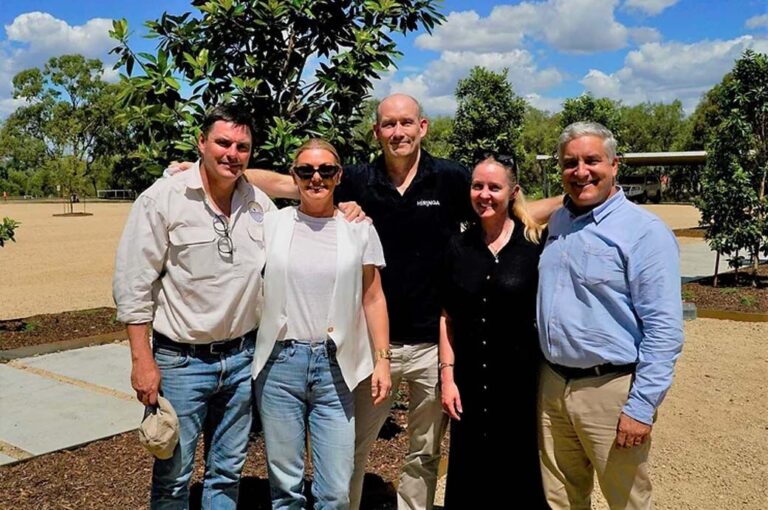
[ad_1]
The Good Earth Green Hydrogen and Ammonia (GEGHA) project will see an integrated solar energy to hydrogen and ammonia operation implemented at the Wathagar ginning facility, on the ‘Keytah’ agricultural property, near Moree in northern New South Wales – the world’s first Good Earth Cotton farm, producing climate positive and traceable cotton.
The Good Earth Green Hydrogen and Ammonia (GEGHA) project, a collaboration between Sundown Pastoral Co and Hiringa Energy, aims to introduce a low-carbon and sustainable agricultural system in the Moree region of New South Wales, Australia. It aims to provide a long-term sustainable pathway for multiple hard-to-abate agricultural and logistics activities.
Built in partnership with hydrogen leader Hiringa Energy who is the project developer, joint owner and operator, the GEGHA project will provide a long-term sustainable pathway for multiple hard-to-abate agricultural and logistics activities in the Moree area, including ammonia-based fertiliser, on-farm energy use and the transportation of agricultural goods to export markets. GEGHA demonstrates the opportunity for a more secure, localised and low-carbon supply chain for replacement of emissions-intensive imported fertiliser, diesel and LPG used in the agricultural and transport sector in NSW and more broadly.
By supplying low-carbon hydrogen for refuelling of heavy road transport at sites in the Moree region through the specialist expertise of Hiringa Energy, the GEGHA project aims to stimulate growth of the hydrogen transportation sector locally and throughout NSW. Hydrogen provides a broad range of opportunities for agricultural producers to decarbonise transport-related emissions as they move their crops to global markets for lower-carbon food and fibre.
The GEGHA project will involve the installation of the 27 MW Wathagar solar farm, providing energy for the seasonal ginning operations, feeding excess electricity into the grid, and creating hydrogen and ammonia to displace diesel, LPG and alternative nitrogen-based fertilisers. The project is being carried out in stages, with the near-complete 9 MW first stage to be followed by two more 9 MW modules.
Some of the hydrogen is converted to anhydrous ammonia (NH 3) for on-farm fertiliser use at ‘Keytah’ and other regional properties, and the balance will be utilised in multiple applications to displace diesel and LPG in stationary motors, mobile farming plant, and the drying of raw cotton.
GEGHA intends to produce about 45,000 MWh of energy per annum (equivalent to powering over 4,000 homes), making 3,800 MT of anhydrous ammonia to displace the equivalent of 6,800 MT of imported urea, as well as enough low-carbon hydrogen to displace more than 1.4 million litres of imported diesel.
David and Danielle Statham, owners of Sundown Pastoral Company and the visionaries behind climate positive regenerative cotton programme Good Earth Cotton and traceability technology FibreTrace, set out with a mission to showcase that Australian agricultural leaders have an integral role to play in reduction of climate impact.
“Hydrogen and green ammonia provide a unique opportunity to secure cost effective, clean, secure energy for power, heat, farm operations and transportation, as well as green fertilisers for agriculture – it is so important for us to be part of leading this change for the environment and our communities,” said David Statham.
The Australian agricultural sector has recently seen the closure of domestic production capacity and diversion of ammonia to make explosives for mining and supply international markets, as a result some farmers decided against utilising the fertiliser source in 2022. This reduced crop production levels and downgraded the quality of the produce (e.g., low protein wheat).
With its dedicated focus on the agricultural fertiliser market, the GEHGA project intends to increase local agricultural production, and decarbonise it, by manufacturing fertiliser close to the point of use and eliminating the carbon-intensive use of methane feedstock, while using renewable energy to drive the process.
The project is estimated to directly abate around 20,000 tonnes of CO2 per year at full capacity, assuming direct substitution of existing emissions-intensive urea and anhydrous ammonia fertiliser, diesel and LPG. There is substantial additional indirect abatement and safety benefits associated with reduced shipping and heavy vehicle movements required to bring fertiliser and diesel across the world to coastal import facilities, then unload, store, reload and truck them hundreds of kilometres inland to Moree.
Andrew Clennett, chief executive of Hiringa Energy, has guided the development of Hiringa’s globally leading commercial hydrogen heavy vehicle refuelling network currently under construction in New Zealand, as well as the Kapuni wind-to-hydrogen-to-urea project nearing its final investment decision.
“We have been seeking to transfer our hard-won hydrogen industry experience to the rapidly developing Australian hydrogen market, and are very pleased to have found such a suitable partner in Sundown Pastoral. As developer, project manager and operator of the GEGHA project, we look forward to proving the technical and commercial model at GEGHA, and investing further both in downstream refuelling facilities, and scaled-up low-carbon hydrogen and ammonia hubs in the coming years,” Clennett explained.
“This agreement gives Hiringa the momentum to further build our capacity and presence in Australia with exciting opportunities emerging in regions such as Moree and within our Australian business operations in Sydney,” David Heard, Hiringa’s executive director Australia, added.
The GEGHA project is set to decarbonise, decentralise, and improve the resilience and security for a cleaner Australian agricultural industry.
Fibre2Fashion News Desk (RR)
[ad_2]
Source link